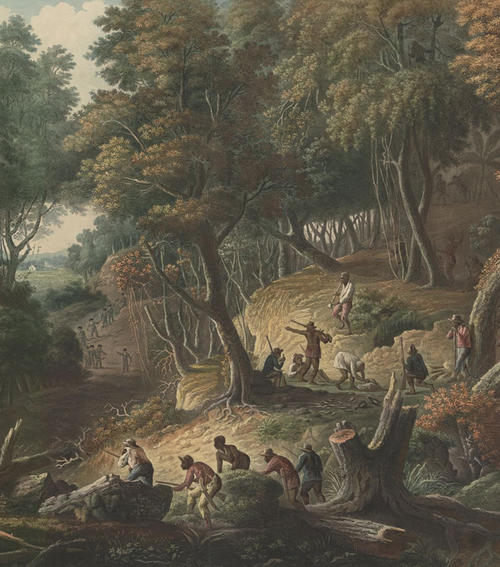
The forced enslavement of millions of African men, women, and children powered the transatlantic economy in the eighteenth and nineteenth centuries. From New York to Barbados, enslaved people worked on docks, cultivated Virginia tobacco, or labored on hellish Caribbean sugar plantations. Individual Scots, such as the tobacco merchant William Cunninghame, and institutions, like the University of Glasgow, directly benefited from slavery and the slave trade.
Slavery and the enslaved's vital role in creating the British Atlantic world was not without legal consequence. British and British American courts wrestled with slavery's legality in the eighteenth century, particularly as British jurists worked to clarify the distinctions between colonial, British, and imperial slave law. The famous cases of Somerset v. Stewart (1772) in the Court of King's Bench in England and Knight v. Wedderburn (1778) in the Court of Session are critical examples of this effort.
Beyond the question of slavery's legality, litigation before the Court of Session provides evidence of the lives of slaves and freed people. In the cases offered here, they make appearances both incidental and central to a case. From the anonymous individuals mentioned in the log book of a ship plying the transatlantic mahogany trade to James Graham, a recently-freed Glaswegian tradesmen who resisted impressment into the Royal Navy during the American Revolution, Court of Session cases reveal much about the centrality of slavery to the British Atlantic and the people who experienced it.
Related Cases
| Case | Date | Legal Subjects | Abstract |
|---|---|---|---|
| Houston Stewart Nicolson, Esq v. Mrs Stewart Nicolson | 6 Dec 1770 | Adultery, Divorce | Houston Sterwart-Nicolson was married to Mrs. Sterwart-Nicolson in 1764. Mr Nicolson having brought an action of divorce against his wife for adultery, supposedly with William Grahame a employee and servant of Sir William Maxwell of Springkell, brother-in-law of the pusuer. Mrs Nicolson made a declaration of her innocence, and she insisted that the pursuer misled the situation and created artful stories about his adultery. She, as the defender, objected to the charges and questioned the competence of the witness that her husband, Mr. Nicolson, presented because all of them were servants of Sir William Maxwell, pursuer's brother-in-law. |
| Walpoles v. John Walker | 10 Mar 1778 | Reduction of a Trust Deed, Fraud, Commission of Bankruptcy In England | This case concerns a trust disposition granted by William Alexander to John Walker in September 1775, shortly before an English commission of bankruptcy was awarded against the former. The largest English creditors of William Alexander held mortgages on two Grenada estates jointly owned by him and his brother. They brought an action to have the above-mentioned trust-deed reduced. In January of 1778 Lord Monboddo assoilzied (absolved) the defender. The pursuers petitioned the Court to alter this decision. They argued that the trust was voided by a petition for a sequestration brought before Lord Gardenstone by William Alexander in April 1777. In addition, the pursuers argued that the trust-deed failed under the statutes 1621 (relating to conjunct and confident persons) and 1696 (regarding diligence), "or, at least, that they ought, without hesitation, to be reduced, on the head of fraud, at common law." Regarding this charge of fraud, the pursuers claimed that they had an indisputable claim to the proceeds of the Grenada plantations, but that the Alexander brothers, aided by the defender, went through elaborate lengths to conceal these profits from their creditors. They further accused William Alexander of sending his trunk of papers to Edinburgh, so as to prevent the pursuers from discovering this fraud. The Court altered Lord Monboddo's interlocutor, sustaining the reasons of reduction. William Alexander then petitioned the Court to alter this interlocutor, which it refused. Similarly, the defender petitioned the Court to either allow the trust to subsist in the person of another trustee, or to declare as bona fide his prior actions as trustee. The circumstances surrounding this case are covered extensively in Jacob M. Price, France and the Chesapeake. In particular, see volume 2, pages 691-700. |
| Stewart v. Graham | 1782 | Impress Service | This case addressed whether a standard press-warrant, which authorized the impressment of seamen, applied to a man who had worked aboard ships while enslaved. The man in question, James Graham, accompanied a slaveholder on voyages between Scotland and the Caribbean, performing duties such as steering and reefing. However, when Graham’s enslavement ended, he became apprenticed to Grant, Wood, and Company, a carpet manufacturing company in Glasgow. The petitioner in this case, Lieutenant William Stewart, subsequently attempted to press Graham into naval service based on his sailing experience. Grant, Wood, and Company petitioned the magistrates of Glasgow to prevent Graham’s impressment, and Graham appeared on his own behalf. After allowing the parties to gather proof, the magistrates found that Graham could not be impressed because he did not voluntarily choose a seafaring life. Lieutenant Stewart appealed to the Court of Session. |
| Hugh Rose v. Macleay's Trustees | 1837 | Case documents digitized and available. Description in progress. | |
| Donaldson v. Taylor | 6 Jan 1764 |
